Sprouts: An Inexpensive, Simple Way to Grow Enzymes in Your Kitchen
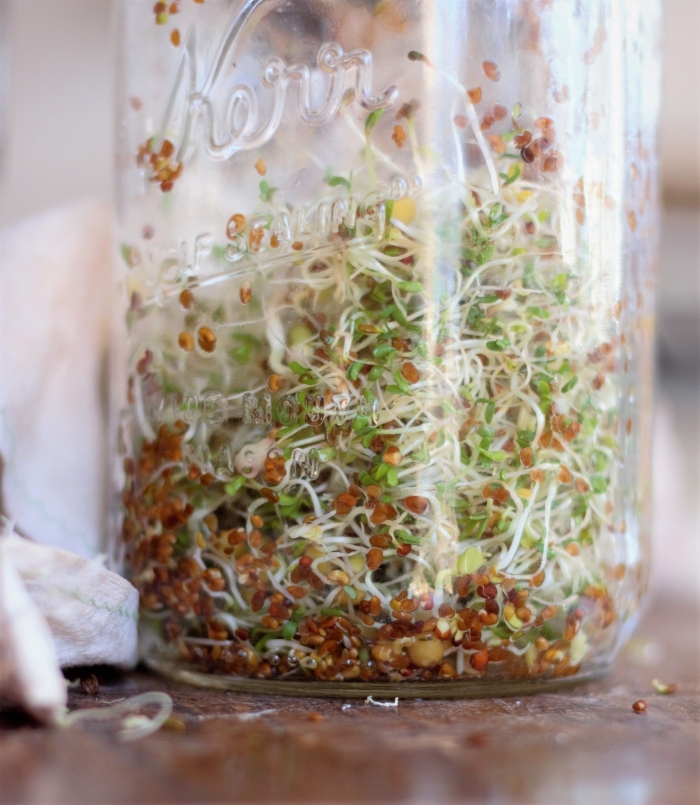
I tend to paralyze easily when something seems like a large undertaking. Before I gave it a try, cheesemaking was like this for me. Now we have a couple of simple goat milk cheeses I make and it seems crazy how easy that is. This also happened to me last week when Annie and I decided to clean out and reorganize the kitchen cabinets. By lunch time we’d gotten as far as taking everything out and filling the entire floor and dining table with their contents, which coincided exactly with everyone’s desperate need for lunch and a nap.
Paralyzed.
Thankfully, sprouting is less like cabinet organization and more like making simple cheese – way easier than you thought it would be and with fewer people crying.
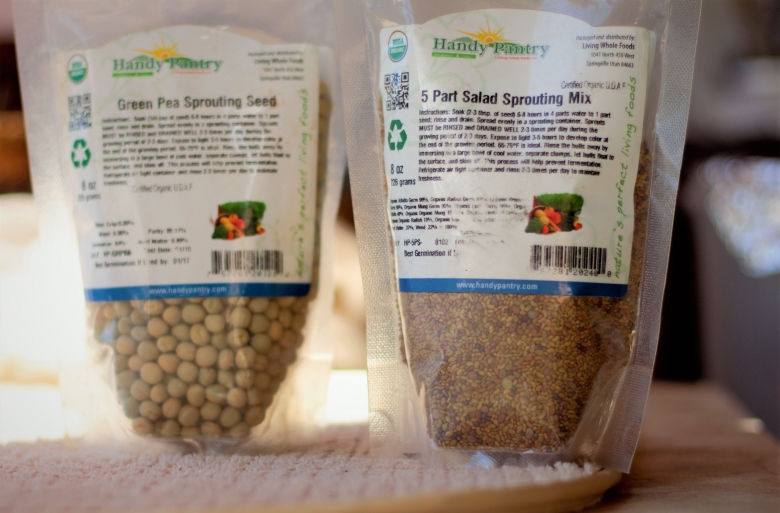
Sprouting is great for this time of year when the garden is either still dormant or just beginning to show life again. Sprouts are one of the absolute best sources of enzymes, according to this article:
While all raw foods contain enzymes, the most powerful enzyme-rich foods are those that are sprouted (seeds and legumes).
Beyond sprouts, that article details why enzymes are really important not just for digestion, but for every function of the body and particular in fighting off inflammation. This is the number one reason we grow sprouts, though we also just like the flavor and texture as well.
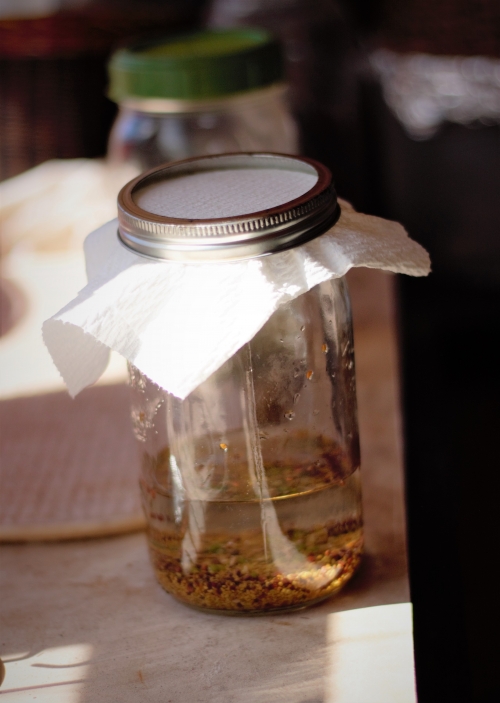
How to Grow Sprouts Simply
Seeds will sprout if given enough moisture and warmth. That is really all there is to sprouting seeds whether in soil or your home kitchen. If you have water and unadulterated seeds, you can grow sprouts. If you get really into growing sprouts, there are all sorts of sprouters to aid your efforts, but really a canning jar and a ring is all the equipment you need.
If, like me, you were thinking it was one of those things you simply couldn’t get to, here is how simple it is to make salad sprouts:
- Place 2-4 Tablespoons of sprouts into a quart jar and cover with 1.5 cups water. Cover jar with a sprouting screen, cloth, or heavy duty paper towel fastened with a rubber band or canning ring. Allow to soak for 8-12 hours or overnight.
- Drain off the soaking water. Rinse and drain them and tilt the jar upside down at about a 45 degree angle in a small bowl. This allows any excess water to drain off.
- Repeat rinsing and draining twice a day in cooler weather, three or four times a day in hot weather. After 4-6 days you should have fully developed salad sprouts.
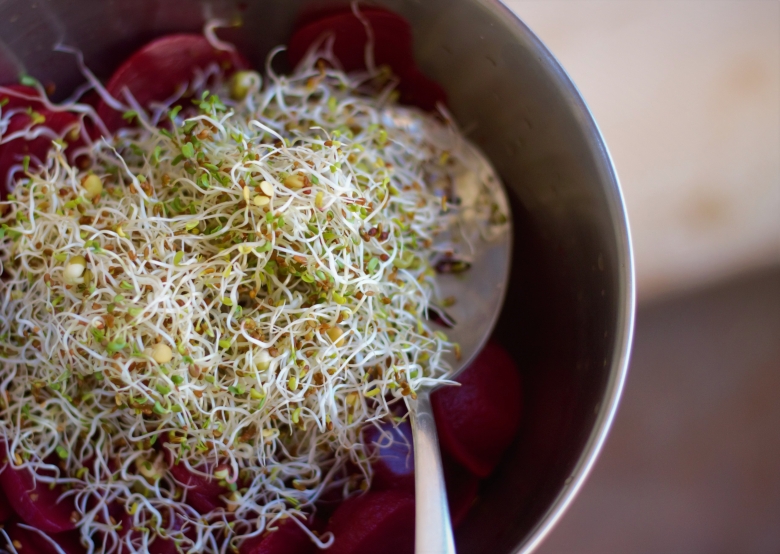
I like to leave my sprouts right next to our water filter so that I see them which reminds me to rinse them as necessary. In the summer I rinse even salad sprouts about three times per day. Legume seeds – peas and beans – tend to need more frequent rinsing due to their high sugar content which can ferment quickly.
Y’all know that I’m not opposed to a little stinky fermentation, but sprouting is a different biological process than fermentation. Plus, sprouted beans are usually crisp and clean in flavor and fermented beans… well, they stink.
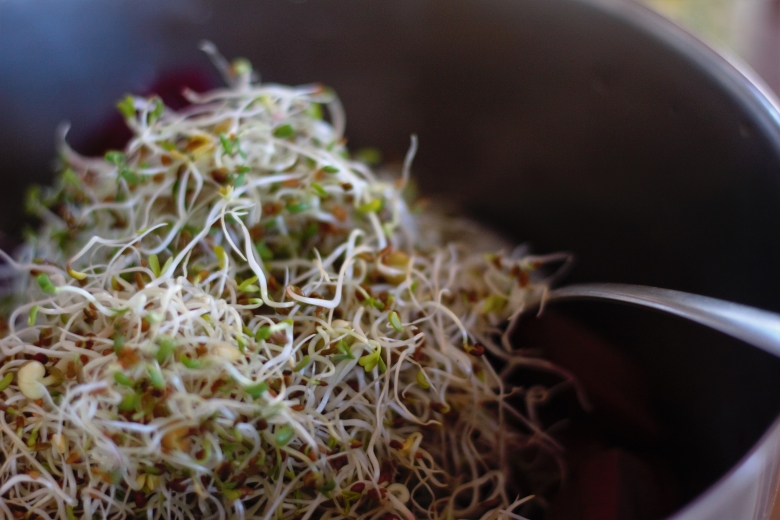
Using and Eating Sprouts
The simplest way to incorporate sprouts is to add them to salads and sandwiches. I also just throw them on to a plate or on top of a bowl of whatever we’re eating. They go well with quiche, beans and rice, and tacos and are great layered with my other favorite enzyme-rich food: ferments!
Sprouts also go undetected in smoothies and can be mixed into avocado for guac or creamy kefir cheese for a dip full of zip and enzymes. Some homegrown garlic and herbs and a squeeze of lemon gives you just what you need to dip raw veggies in for even more enzymes.
Resources
I don’t own a lot of gadgets in general, but the following items I own and use regularly for sprouting:


Hi, I’d love to do this! I live sprouts and the ones in the grocery store are always terrible – slimy and rotten before they even hit the shelf. Could you tell me the best place to buy sprouting seeds?
Thank you!
thanks so much for the links to buy the supplies we need to do this. I’m so excited to start.
What’s the difference between sprouts and microgreens? Is there less worry of mold, etc., with the growing greens? Same enzyme profile?
Thank you so much for sharing! I enjoy your blog immensely!! Do you sprout alfalfa seeds? Alfalfa sprouts used to be my favorite, but I recently read they can inhibit the immune system. I’m curious if you have any insight in this.
I didn’t enjoy sprouts when I was younger but this post pushed me to give them a try. I sprouted lentils as it is what I had in my pantry and my body likes them. They are pretty much done and I have been munching on them already. Thank you for such an encouraging post for a momma in the trenches!